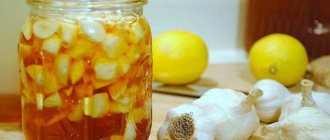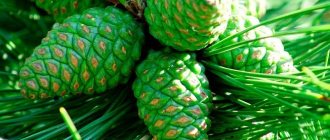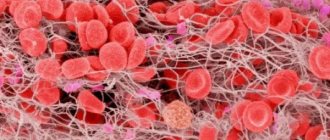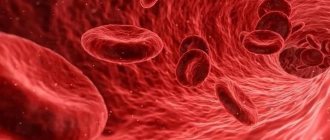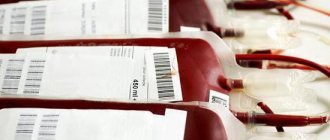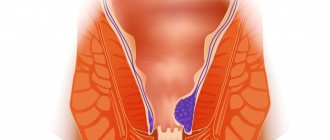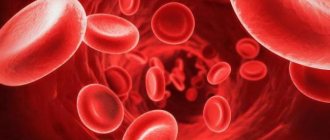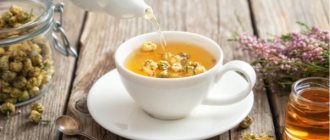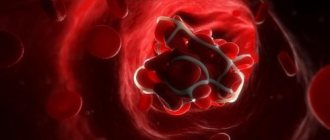Recently, more and more people suffering from hypercoagulability are refusing to take medications and prefer folk remedies that help make the blood more fluid.
Swallowing a tablet is much easier and faster than preparing tinctures and decoctions, but pharmaceutical drugs in any case have a toxic effect on the body, so their use is undesirable.
Tablets taken regularly can adversely affect the stomach and liver, worsening the functioning of the digestive tract as a whole. It is much wiser to use folk remedies to thin the blood, because if taken correctly they will not cause any harm to your health.
How to deal with thick blood
If a person’s blood is very viscous and clots too quickly, such a deviation can lead to the development of serious pathologies. Many hypercoagulable patients struggle with blood clots and other cardiovascular changes in the future.
If blood clotting is too high, the risk of heart attack and stroke also increases, which can lead to disability and even death.
If a person's blood is too thick, the following methods can be used to reduce blood viscosity:
- taking medications;
- changing your diet and avoiding unhealthy foods;
- use of traditional medicine;
- lifestyle change.
Many patients neglect traditional methods, but numerous clinical studies have confirmed that various decoctions and medications really help reduce viscosity. The only drawback of this therapy is that it is quite slow.
Goji berries are a natural blood thinner
Used as a medicinal plant or medicinal fruit in Asia, the berry is said to be capable of enhancing the effects of blood thinners to such an extent that in some cases a significant increase in INR value was observed after the respective patients drank goji berry tea or juice.
It is not yet known how the berry does this, but it is suspected that it has a strong blood-thinning effect. Therefore, there is a strong warning against taking goji berry medications if you are taking blood thinners.
Unfortunately, it has not been tested whether goji berry can provide enough blood thinning for some patients to be able to stop taking anticoagulants completely.
Goji berry can serve as a natural blood thinner. But there are many other foods, herbs and spices that thin the blood.
Of course, they will never reduce blood clotting the way pharmaceutical blood thinners do, but that's a good thing. Because nature always seeks to regulate and heal. It will never thin the blood so much that internal bleeding occurs.
If you include natural blood thinners in your diet, this measure, together with a healthy lifestyle, will also help prevent the occurrence of cardiovascular diseases.
When is blood thinning required?
Cardiovascular pathologies accompanied by circulatory disorders often result in death if not treated in time.
Doctors warn that an increased likelihood of blood clots and accelerated blood clotting occurs with pathologies such as:
- acute and chronic thrombophlebitis;
- phlebeurysm;
- deep vein thrombosis;
- venous insufficiency (regardless of the stage of changes);
- pulmonary thromboembolism;
- atherosclerosis;
- cardiac ischemia;
- recent stroke;
- obesity;
- diabetes;
- Increased levels of platelets and red blood cells.
The risk of pathology also increases with the use of oral contraceptives and other hormonal drugs.
Garlic
Garlic
Garlic has natural antibacterial and antimicrobial properties, as well as anticoagulant activity and reduces the formation of blood clots. The best way to reap the benefits of garlic is to crush the cloves with the flat of a knife to “release” the beneficial compounds, then eat the cloves raw or quickly roast them in the oven.
What effect can you expect?
If a person takes anticoagulants regularly, their condition will improve significantly after a few weeks of taking it. Both drugs and folk remedies help to achieve such effects:
- Prevention of thrombosis. The likelihood of pathogenic blood clots forming is reduced by approximately 30%.
- Normalization of blood pressure (hypercoagulation very often leads to arterial hypertension).
- Saturate tissues and blood with microelements and vitamins.
- Improves concentration.
- Supports oxygen saturation of the body.
- It regulates the functioning of the circulatory system as a whole.
- Relief of symptoms of anemia.
- To prevent angina, heart attack and stroke.
It should be borne in mind that traditional blood thinning methods do not act as quickly as medications. The positive effect appears no earlier than after 2-3 weeks of regular therapy.
Blood thinners: coumarins, heparins and acetylsalicylic acid
The term "blood thinner" is a little misleading because it doesn't actually thin the blood. The drugs only prevent it from clotting. Since the term "blood thinner" is widely used in the vernacular and is easily understood by everyone, we use it in this article even if it is not professionally correct.
Because blood clotting requires different processes, blood thinners can reduce clotting by using very different mechanisms to make the blood less thick.
Coumarins
In Europe, most people take coumarins, also called vitamin K antagonists, because they block its action. Vitamin K is necessary for the body to form clotting factors. If this vitamin is blocked, clotting factors cannot be formed and the blood becomes thinner, meaning it no longer clots as easily.
Coagulation factors (blood clotting factors) are special endogenous proteins that can change their state from liquid to solid under certain conditions (for example, in the case of injury) and thereby lead to stagnation of blood in some places and the formation of blood clots.
The group of vitamin K antagonists includes phenprocoumon (commercially known as Marcumar) and warfarin.
Heparins
Other blood thinners are heparins. If you were given injections to prevent thrombosis after surgery, it was most likely heparin. Heparins work differently than vitamin K antagonists. They speed up the action of the body's own anticoagulants (antithrombin).
Acetylsalicylic acid
You may be taking acetylsalicylic acid (such as aspirin) to thin your blood. This group of blood thinners suppresses the function of platelets so that they can no longer form clots as well.
The best means
Leading doctors agree that it is better to combat high blood viscosity using traditional methods than using medications.
Properly prepared decoctions and tinctures not only help improve the patient’s condition, but also do not cause complications. However, before starting therapy, consultation with a specialist doctor is necessary.
Herbal decoctions
Among folk recipes, decoctions based on medicinal herbs are very popular. It is recommended to cook them for several days. If the medicine is left in the refrigerator for a long time, it will lose its beneficial properties.
Despite the fact that these products are prepared on the basis of natural ingredients, they can only be used after consultation with a doctor. Folk remedies, like any other drugs, have certain contraindications and, if used incorrectly, can provoke the development of complications.
Tinctures
Various tinctures are also effective. In most cases, such preparations are prepared on the basis of vodka.
Pharmacy fees
Some pharmacies offer ready-made blood thinner kits. Although herbal remedies can be purchased without a prescription, they should only be used after consulting a doctor.
The following meetings are best suited:
- wormwood, mint, willow;
- white willow;
- clover, wormwood, mountain arnica.
If the herbal harvest cannot be found in the pharmacy, it can be ordered online.
The fastest recipes
If the patient does not have time to prepare the decoction, the following measures will help normalize blood viscosity:
- Green tea. This drink regulates the functioning of the cardiovascular system and normalizes blood pressure. It is recommended to drink in the morning and evening.
- Soda. Dissolve a teaspoon of this powder in a glass of warm water and drink the resulting liquid. This drug not only helps to thin the plasma, but also restores cellular metabolism.
- Fresh fruit and vegetable juices. You can reduce the viscosity of your blood plasma by regularly consuming natural juices of orange, peach, tangerine, watermelon and plum.
Sea kale
Sea kale salad, recipe here
Sea kale (aka kelp) and other types of algae are natural anticoagulants, thanks, among other things, to the large amount of iodine they contain. Including seaweed in your menu may benefit people with high blood pressure by increasing vascular tone and reducing blood viscosity.
Blood thinning during pregnancy
Hypercoagulability is also observed in more than 50% of pregnant women. Doctors warn that during pregnancy you should not use various decoctions and tinctures, much less medications.
It should be understood that a woman’s body is very susceptible to the effects of various pharmaceutical substances and medicinal herbs; they should not be used unless absolutely necessary.
If your body experiences increased blood clotting, the right foods will help you cope with it:
Also, women in this position are advised to maintain a drinking regime and consume at least 1.5 liters of water per day.
General contraindications
It should be understood that not all folk recipes are safe. Some herbs and foods, if improperly prepared or consumed in excess, can cause various complications.
Herbal medicine is not recommended in the following cases:
- Carrying a child;
- lactation period.
It should only be accessed after consultation and consent of a physician, regardless of the patient's condition, age, or health status.
When used regularly, folk remedies help achieve positive results and reduce blood density. However, to be sure of the effectiveness of therapy, the test must be performed at least once every six months. If there is no positive effect, the doctor will prescribe another, more effective remedy.
Natural blood thinners
Unfortunately, natural blood thinners are not very popular in science and research. On the contrary, it is even preferable to warn patients taking anticoagulants about the effects of natural blood thinners and discourage their use.
It's a pity. Because it is possible to naturally thin your blood and significantly improve your well-being without constantly resorting to medications with dangerous side effects.
However, since there has been little research into the mechanism of action and proper dosage of natural blood thinning products, their targeted consumption is officially reserved for prevention only.
For the same reason, we cannot provide specific dosage information. Therefore, the possibility of taking dietary supplements and herbs to thin the blood should be discussed with your doctor.
According to various studies in recent years, blood-thinning and blood vessel-protecting foods and dietary supplements include:
- Nattokinase;
- Bromelain;
- Turmeric;
- Ginger;
- Cinnamon;
- Capsaicin;
- Garlic;
- Omega-3 fatty acids;
- Nettle and basil;
- Dark chocolate;
- Oligomeric proanthocyanidins.
The following foods (and many others) may also act as natural blood thinners:
- Bulb onions;
- Red wine extract (resveratrol);
- Ginseng;
- Tomatoes;
- Berries.
Nattokinase
In 2006, Californian scientists were able to demonstrate in the laboratory a significant reduction in blood clotting and viscosity using an enzyme called nattokinase, which is obtained from fermented soybeans. Nattokinase is considered a good fibrinolytic (anticoagulant) agent.
For this reason, some manufacturers have been enthusiastic about the fact that nattokinase is a natural blood thinner and can quickly dissolve blood clots. This, of course, was quickly averted. Because dietary supplements cannot be advertised with such specific "healing claims" - regardless of whether the claim is correct or not.
However, in another study, this time on humans, the blood thinning effect of soy enzyme was confirmed. In a 2015 Japanese study of 12 healthy young men, a single dose of nattokinase showed improved fibrinolysis (the process of dissolving blood clots and blood clots). This means that nattokinase increased the body's ability to dissolve blood clots on its own.
However, nattokinase is an isolated enzyme, which means it is not a natural food on its own. Therefore, if dosed incorrectly, it can also (like medicated blood thinners) cause excessive blood thinning.
If you want to consume nattokinase in its natural form through food, you might consider eating natto, a traditional Japanese dish made from fermented soybeans that can be purchased in some Asian stores.
However, this dish is relatively rich in vitamin K. It (in large doses) is an antagonist for blood thinners. Therefore, it is better to use the product “nattokinase” purified from vitamin K.
Bromelain
Scientists at the British University of West London conducted six studies on bromelain and blood thinning in 2011. Bromelain, a known enzyme from pineapple, has been shown to be suitable for the treatment of acute thrombophlebitis (superficial vein thrombosis) as it reduces platelet clumping (blood clotting), has a protective effect on the heart and prevents the formation of blood clots.
Turmeric
Turmeric is a spice that has now been extensively studied. It has many health benefits, whether it's detoxifying, protecting your liver and teeth, lowering blood sugar, or preventing cancer.
Research shows that turmeric protects against arteriosclerosis and platelet clumping by preventing blood clots. The blood thinning effects of turmeric seem to be so impressive that it is even recommended to stop taking turmeric supplements two weeks before your scheduled surgery.
Turmeric may also increase the blood thinning effects of warfarin, aspirin, etc., so it is not recommended as a dietary supplement if you are taking pharmaceutical anticoagulants.
A 2012 Korean study examined the anticoagulant properties of curcumin, an isolated active compound from turmeric. Surprisingly, the blood thinning effects of curcumin were so good that it was said that daily consumption of turmeric can maintain healthy blood properties for a long time.
Ginger
Ginger is also considered a natural blood thinner. In a study conducted in Australia in 2003, the activity of substances isolated from ginger root was tested for blood clotting. Ginger thinned the blood better than aspirin.
However, a person does not eat isolated substances of ginger root, and most often only a piece of it. Therefore, he does not take so many blood thinners that they have a strong anticoagulant effect.
But regular consumption of ginger root in any case promotes healthy blood. After all, it has strong antioxidant properties, which make ginger an excellent protector of the cardiovascular system.
Cinnamon
Cinnamon has anticoagulant effects, but mainly in the form of extracts, such as cinnamon essential oil or cinnamon distillate. Aqueous extract of cinnamon (cinnamon tea) does not have a blood thinning effect. This also suggests that cinnamon-specific substances must be taken in high doses to achieve therapeutic effects.
Cayenne pepper (capsaicin)
A 2014 Australian study found that capsaicin, a hot ingredient from chili peppers (cayenne pepper), may act as a natural blood thinner and slow the progression of blood clots. Chili peppers have blood thinning properties, but only in large doses or in the form of isolated capsaicin as a dietary supplement.
Garlic
Garlic has many beneficial properties related to vascular and blood health. It lowers cholesterol and blood pressure, dissolves blood clots. That is, a small onion influences all those factors that could otherwise lead to cardiovascular disease. Unfortunately, there is no consensus on the appropriate dosage.
There are also no current studies that specifically address garlic as a natural blood thinner. Garlic is rather more recommended as part of a healthy diet to prevent arteriosclerosis.
Omega-3 fatty acids
Omega-3 fatty acids are known for their blood thinning effects. Taking these natural blood thinners along with anticoagulant medications increases their effectiveness.
When you take omega-3s preventatively (as a dietary supplement) or cook with the appropriate oils, you are promoting healthy blood flow.
Interestingly, alpha-linolenic acid seems to be particularly effective here. It is a much better blood thinner than the long-chain omega-3 fatty acids DHA and EPA.
An excellent blood thinner is adding flaxseed and hemp oil to fresh food (these oils should not be heated).
Nettle and basil
Interestingly, even foods rich in vitamin K, such as nettle and basil, can thin the blood. Research has shown this. However, in the experiments they used not the green leaves of these plants, but an aqueous extract, that is, tea from nettle or basil.
But don't consider vitamin K the enemy. After all, foods rich in vitamin K are some of the healthiest, such as broccoli, cauliflower, herbs and all green leafy vegetables.
It is now known that eating these foods is not a problem while taking blood thinners. It is only necessary to adjust the dosage of anticoagulants accordingly and consume a similar amount of vitamin K daily to avoid large fluctuations.
Foods rich in vitamin K have more advantages than disadvantages for blood thinner patients. After all, they naturally supply the body not only with vitamin K, but also with calcium, magnesium, chlorophyll and valuable secondary plant substances.
Cocoa and dark chocolate
The active substances in natural cocoa are so strong that dark chocolate (with a high cocoa content and little or no sugar) becomes a real medicine!
Cocoa contains many highly concentrated flavonoids and oligomeric proanthocyanidins. In 2003, the American Journal of Clinical Nutrition reported on a study in which participants were given either a cocoa supplement or a placebo for 28 days. At the end of the trial, participants who consumed cocoa had significantly reduced blood clotting. This shows that cocoa is well suited as a natural blood thinner.
Oligomeric proanthocyanidins
Of course, oligomeric proanthocyanidins are not only found in cocoa. Appropriate amounts of proanthocyanidins are also present in grape seed and red wine extract (resveratrol).
Proanthocyanidins have excellent properties for the cardiovascular system.
As a powerful antioxidant, they protect the walls of blood vessels from oxidative stress and the effects of free radicals. Blood vessels remain elastic and stable. No damage or deposits are formed.
Oligomeric proanthocyanidins have been proven to relieve pain and swelling, so are a good natural aid for the entire vascular system, and therefore improve blood flow.
Combining natural blood thinners
This list of natural blood thinners shows how well a proper diet with appropriate nutritional supplements can protect against excessive blood clotting, blood clots, and slow blood flow.
The foods mentioned above become natural blood thinners thanks to flavonoids (certain phytonutrients). This is why a plant-based diet is an excellent disease preventative when it comes to cardiovascular problems.

